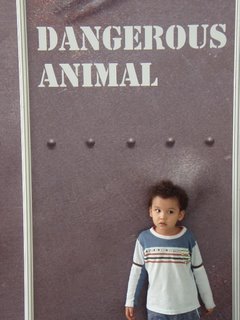The peer group of a prodigy: intelligent adults.
A prodigy has no peer and no peers. That is, by definition, they are outstandingly unusual, for their age, in the sense that no-one is better - and also they have no peers, of their own age. This is both the beauty and the tragedy of the progidy. What they can do is wonderful to behold - and no-one who has never met one, and held a discussion with one, has any idea of how marvellous they are - but it is also tragic, in that their very gift tends to isolate them. If they are to talk of their true mind, none of their age peers can understand.
I wrote of Mensa of Singapore and our experience with trying to introduce Ainan to them. It wasn't a happy one: their minds were closed to even considering the idea for reasons known only to them. However, a reader has alerted me to an interpretation of this that I had not seen: the implication that a Mensa member was Ainan's peer. This is not so. It is not so for any prodigy. Why is this? Well, Mensa selects the top 2% of the population, in IQ terms. That is they select one out of every fifty people. That isn't particularly rare. A typical school of a thousand children would expect to have 20 potential members. Yet, does a typical school have 20 prodigies? No. A typical school has no prodigies at all. In fact, a typical city might not, either. True prodigies are very rare. How rare, I do not know...except to say that in my search for them, I found very few true examples. The rarity value, then, of a prodigy's abilities is far higher than 1 in 50 - and so Mensa members are not the peers of prodigies. Is a high IQ enough for prodigy? It is not. It is just the beginning of the requirements. A prodigy must have an area of excellence, that is highly developed, far beyond age expectations - and a high IQ doesn't guarantee that, though it may help. Special talents or gifts are not really the province of IQ. IQ measures reasoning ability in a subset of human thinking capabilities. It is not enough, in itself, to define a genius. If it were, the world would be filled with geniuses - and it is not. They remain rarely found - and rarely welcomed.
Who then are the peers of prodigies? In terms of performance, intelligent adults are the peers of a prodigy. Why do I say this? Well, it is only intelligent adults who can converse with a true prodigy on a level that the prodigy would wish. Intelligent children are not developed enough to do so, in general. The other child would have to be a prodigy in the same area of interest, for the conversation not to be one-sided. This is not a likely situation.
So, who then are to be the friends of a prodigy? I recommend a mix, for the full development of social skills. There should be bright children of their own age - and bright older children, too, as well as adults who specialize in the area of the child's interest. This would provide them with the relief of an outlet for their thoughts. Care must be taken in the choice of adult friends, for many reasons beyond the obvious. An adult can easily be "inspired" by a prodigy, for instance. So, ensure that they are the type to respect the prodigy's ideas...not adopt them.
Are adults the ideal intellectual companions of the prodigy? No...for though they may have more experience than the prodigy it is likely that the prodigy has greater thinking power, than even a bright adult. Yet, highly intelligent adults, experienced in the prodigy's speciality, are the best peer group available. They will have to do.
Are there any prodigies or parents of prodigies reading this? If so, please get in touch and relate your own experiences and solutions to the difficulties you have faced. Thanks.
(For a particular prodigy, Ainan Celeste Cawley, six, a scientific child prodigy, and his gifted brothers, go to: http://scientific-child-prodigy.blogspot.com/2006/10/scientific-child-prodigy-guide.html )



